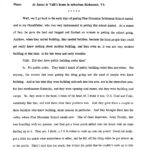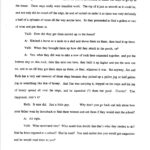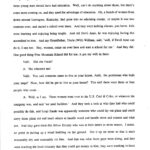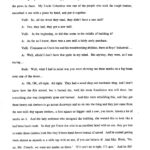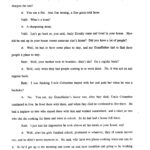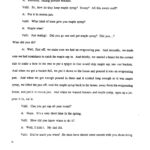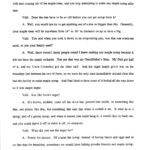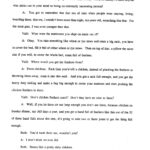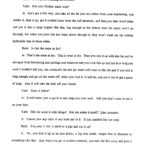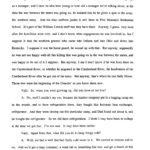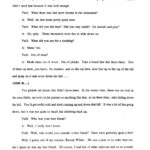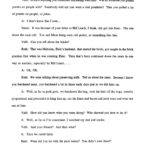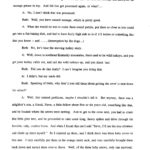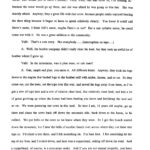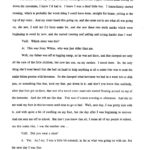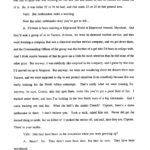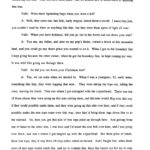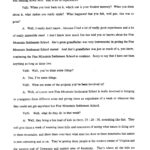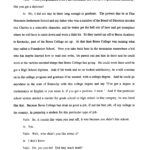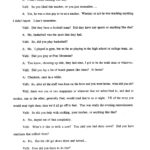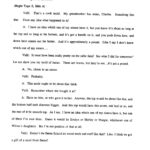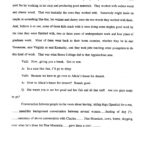Pine Mountain Settlement School
Series 09: BIOGRAPHY – Staff
JAMES CHARLES CREECH Oral Interview Transcript
James Charles Creech, Staff, 1950s
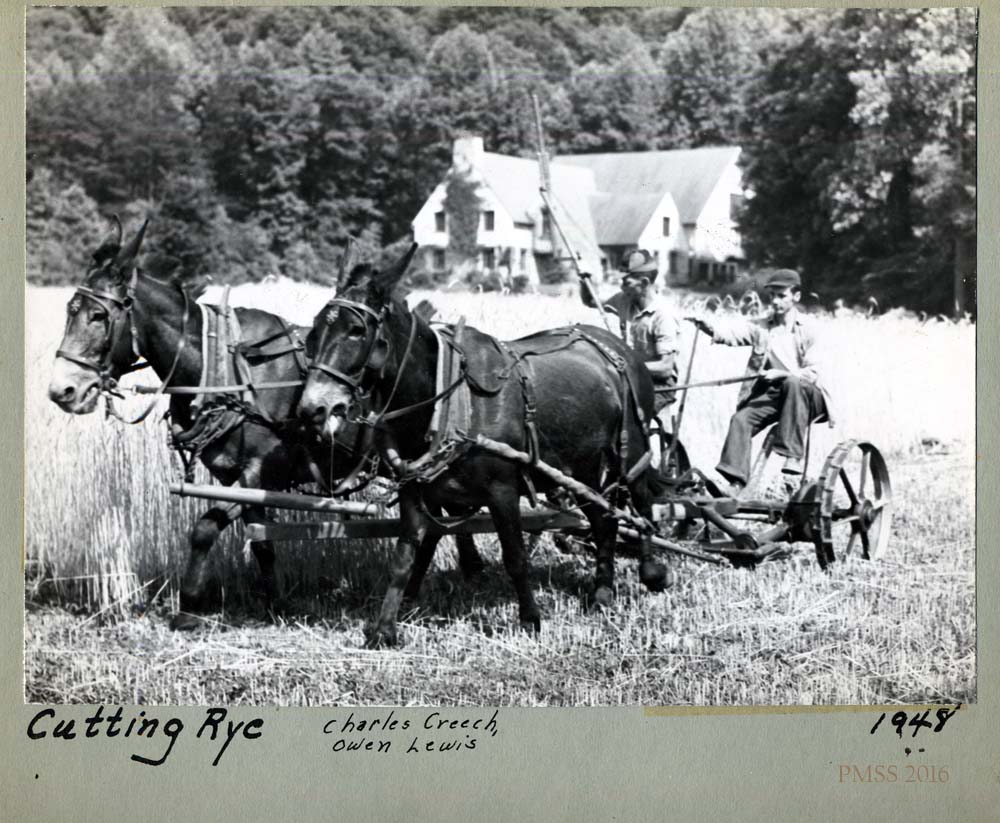
“cutting Rye, Charles Creech, Owen Lewis, 1948.” [nace_II_album_074.jpg]
TAGS: James Charles Creech, oral interviews, coal mining, railroads, stone masons, Andy Drozky, Luigi Zande, Columbus Creech, Joe Creech, Chapel, Boys Industrial Building, Mary Rockwell Hook, maple syrup, mattresses, logging, Civil War, Sally Dixon, Kermit Wilder, butchering, foodways, Steve Hayes, snake bite, military training, environmental education, Berea Academy, Berea College, churning butter, woodworking
JAMES CHARLES CREECH Oral Interview Transcript
Includes: Ruth Smith Creech (Wife of Charles)
and James and Valli Creech
TRANSCRIPTION
Page 1: creech_james_charles_oral_hist_001
INTERVIEW: JAMES CHARLES CREECH
(Also on tape: Ruth Creech (wife of Charles); James and Valli Creech
Date: October 1997
Place: At James & Valli’s home in suburban Richmond, VA
*****
Well, we’ll go back to the early days of getting Pine Mountain Settlement School started, and to my grandfather, who was very instrumental in getting this school started. As a matter
of fact, he gave the land and begged and fotched on women [Katherine Pettit and Ethel de Long] to getting the school going. Anyhow, when they started building, they needed builders, because the local people they could get really knew nothing about modern building, and then even so, it was not very modern building at that time, in the late teens and early twenties.
Valli: Did they have public building codes then?
A: No public codes. They hadn’t heard of public building codes then anywhere. But anyway, the women that were getting this thing going saw the need of people who knew building. And at that time they were building railroads into that area, not in the immediate area, but into southeastern Kentucky, and they were opening coal mines; and they were building coal camps. So, they went to the head, I think it was U.S. Coal and Coke, somebody like that, and told them what their problem was. And they gave them a couple or three builders who knew building, stone masons in particular. And they brought them into the valley where Pine Mountain School stands now. One of these importees, Andy Drozky, that was boarding with my parents, and Dad got a front porch added onto the house with no steps leading up to it. They put, I think, a 2 X 8 timber to walk up onto the porch! Good old Andy got a little too much wine somewhere or other, and he fell off the thing when he got almost up to the porch. Didn’t hurt him too much, but it hurt his pride that he couldn’t walk up to that
Page 2: creech_james_charles_oral_hist_002
porch level. And he says, “Henry, we’re going to change that.” So that was all he ever said about it like that; and he looked around over the land there, and he found a rather large boulder that he thought would do what he wanted to, and he proceeded to chisel out steps to go up to the house. These steps really were beautiful work. The top of it just as smooth as it could be, and not only did he round off the edge, he sort of tucked on under it so there was very definitely a half of a cylinder of stone all the way across here. So they proceeded to find a gallon or two of wine and put those in.
Valli: How did they get them moved up to the house?
A: Hitched a horse or a mule to a sled and shove[d] them on there; then haul[ed] it up there.
Valli: When they brought them up how did they attach to the porch, or…?
A: Yes, what they did was to take a row of rock here cemented together and put the
bottom step on this rock; then this next one here, they built it up higher and put the next one on, and so on till they got three steps up there, or four, whatever it was. But anyway, Jim [Ruth and Charles’s son?] and Ruth [Smith Creech] [have] a very sad memory of those steps because they picked up a gallon jug or half gallon jug or something like that of honey. And Jim was carrying it, tripped on the steps and his jug of honey spread all over the steps, and he squeaked (?) them but good. Correct? That happened, didn’t it?
Ruth: It sure did. Just a little guy. Why don’t you go back and talk about how your father went by horseback to find these women and ask them if they would start the school?
A: All right.
Valli: What motivated him? What made him decide that that’s what they needed to do? Had he been exposed to a school? Had he read? You said earlier that you would get magazines and he would read them to you?
Page 3: creech_james_charles_oral_hist_003
A: Well, that’s when my father, my grandfather who died shortly before I was born, I guess. Apparently, at some point along the line, [he] took a look at what the young men were doing and growing up into. He decided that he saw enough of education that he had decided these young men should have had education. Well, can’t do anything about those, but there’s some more coming on, and they need the advantage of education. Oh, a bunch of women from down around Lexington, Kentucky, had gone into an adjoining county, or maybe it was two counties over, and started a school over there. And they were holding classes, you know, kids were learning and enjoying being taught. And old Devil Anse, he was enjoying having this accredited to him. And my grandfather, Uncle (Will) William [Creech], said, ‘well, if Devil Anse can do it, I can too. Hey, women, come on over here and start a school for me.’ And they did. One good thing Pine Mountain School did for me, it got my wife in there.
Valli: Did she finish? A: She educated me!
Valli: You said someone came to live at your house, Andy, the gentleman who built your steps? Now, how did he get to live at your house? You said there were three or four people who came….
A: Well, as I say. These women went over to the U.S. Coal & Coke, or whatever the company was, and said ‘we need builders.’ And they took a look at who they had who could possibly do this, and Luigi Zande was apparently someone who could lay out plans and could carry those plans out and teach others to handle wood and handle stone and cement and what not. And they gave them this fellow Drozky who was at their annex as stone mason. I mean, no point in putting up a wood building on the ground. Get it up on stone so that it stays reasonably dry and reasonably rot free. And that was what those guys were doing, and they were teaching the local citizenry that they could get money to hire, they were teaching in these
Page 4: creech_james_charles_oral_hist_004
building tricks. And my uncle Columbus [Creech], he became an excellent woodworker, you know, from working with them and doing what they taught him to do and had him to do. So he, if you should ever get up there, the one thing you should go in and see is the chapel. Take a look at the pews in there. My uncle Columbus was one of the people who took the rough lumber, smoothed it out with a plane by hand, and put it together.
Valli: So, all the wood they used, they didn’t have a saw mill?
A: Yes, they had, they got a saw mill.
Valli: In the beginning, or did that come in the middle of building it?
A: As far as I know, there was a saw mill, a fairly early purchase.
Valli: Comment on Uncle Joe [Creech] and his woodworking abilities, there at Boys’ Industrial [Building]….
A: Well, afraid I don’t have that quite in my mind. But anyway, they were, as I was saying…
Ruth: Well, what I had in mind was you were showing me these marks on a big beam over one of the doors…
A: Oh, OK, all right. All right. They had a wood shop and mechanic shop, and I don’t know how the fire started…well, the stone foundation was still there, but everything else was completely gone and burned. [in 1935] And they were rebuilding this, and they got these heavy oak timbers to go across doorways and so on into the thing and they just came from the saw mill — big square timbers, a foot square or bigger — and a saw, you know, leaves a lot of marks on it. And the lady architect [Mary Rockwell Hook] who designed the building, she wanted this to look like it had been hand made. So they got Uncle Joe, who is an excellent hand with an axe, they got him to make these timbers look like they’d been hand-hewn instead of sawed. And he started getting them almost as smooth as a table top with an axe, if you can believe it! And Mrs. Hook, ‘No, no, Mr. Creech, we want axe marks on there.’ ‘If I can’t do it right, I’ll quit.’ And he did!
Page 5: creech_james_charles_oral_hist_005
Valli: How do they get the axe that sharp? A: Well, you know, you chop on it, and it leaves a mark.
Valli: No, how did you keep the axe sharp to cut the timbers? What did they use to sharpen the axe? A: You use a file. And fine honing, a fine grain rock hone.
Valli: What’s a hone? A: A sharpening stone.
Valli: Let’s go back to, you said, Andy Drozky came and lived in your house. How did he end up in your house versus someone else’s house? Did you have a lot of people?
A: Well, he had to have some place to stay, and my grandfather had to find these people a place to stay.
Ruth: Well, your mother took in boarders, didn’t she? On a regular basis?
A: Well, only when they had people coming in to work there. No, it was not on any regular basis.
Ruth: I was thinking Uncle Columbus stayed with her and paid her when he was a bachelor?
A: No. You see, … after they died, Uncle Columbus continued to live, he lived there with them, and when they died he continued to live there. He had a nephew or two who stayed there with him and worked somewhere, and a niece or two who did the cooking for them and went to school. So he had had a house full there.
Ruth: I just had the impression he took almost all his meals at your house, and…
A: Well, after the girls finished school, graduated or whatever, they of course moved out, and he didn’t move anymore in. He said, why have two places cooking when one can do it. So he’d get up in the morning and come up and have breakfast and going to be working
Page 6: creech_james_charles_oral_hist_006 – MISSING IMAGE
Page 7: creech_james_charles_oral_hist_007
A: I was quite small.
Valli: Pancakes? A: Probably, baking powder biscuits.
Valli: So, how do they keep maple syrup? Honey? All this sweet stuff? A: Put it in Mason jars.
Valli: What kind of trees give you maple syrup? A: Maple trees!
Valli: Just testing!. Did you go out and get maple syrup? Did you…? What did you do?
A: Well, first off, we make sure we had an evaporating pan. And secondly, we made sure we had containers to catch the maple sap in. And thirdly, we needed a brace bit the correct size to make a hole in the tree to put a spigot in that would drip maple sap into our buckets. And when we got a bucket full, we put it down to the house and poured it into an evaporating pan. And when we got enough poured in there and it cooked long enough so it was maple syrup, we lifted the pan off, took the maple syrup back to the house, away from the evaporating house, and put it in Mason jars. And when we wanted biscuits and maple syrup, open up a jar, pour it in, eat it.
Valli: Can you get sap all year round? A: Nope. It’s a very short time in the spring.
Valli: How did you know when to do it? A: Well, I didn’t. My dad did.
Valli: Did he teach you when? He must have shared some secrets with you about doing…
Page 8: creech_james_charles_oral_hist_008
A: Well, what it amounted to is when things get to warm up in late February, early March, is when the sap starts to rise in the maple tree. And sometime in early April, the leaves will start coming out of the maple trees, and you stop attempting to make any maple syrup after that.
Valli: Does the tree have to be so old before you can get syrup from it?
A: Well, you would not try to get anything out of a tree no bigger than this. Generally, your maple trees will be anywhere from 14″ to 16″ in diameter on up to have a big….
Valli: You said when you took it down to an evaporating pan, was that one everyone used, or just your family used?
A: Well, there weren’t many people ‘round I knew making any maple syrup because it did not have the maple orchards. You see that was my grandfather’s farm. My dad got half of it, and my uncle Columbus got the other half. And the sugar maple grove was on the boundary line between the two of them, so we were the only ones immediately around close that had the facility to make maple syrup. And Dad liked to have some of it boiled all the way down so it was maple sugar.
Valli: Just like brown sugar?
A: It’s brown, molded, came off the stove hot, poured into molds, or something like that, not plastic like that, but something that size that when it cooled it set. It went in as a syrup, sort of a grainy syrup, and when it cooled you could bang it, it would clop on back out, and you could shave it off or chew it off, or whatever.
Valli: What did you use the sugar for?
A: Purely for dessert. Of course the syrup, instead of having bacon and eggs and so on like that for breakfast, sometimes we would have baking powder biscuits and maple syrup.
Valli: Now, are bees attracted to maple syrup?
Page 9: creech_james_charles_oral_hist_009
A: No. Well, at the time the maple syrup is stopped flowing, the bees are still not out of their hives looking for…
Valli: I wanted to ask when people would come to stay with your family, is there anyone who sticks out in your mind as being an extremely interesting person?
A: You got to remember that that era of time when people were staying, living, boarding there, that era, I couldn’t been more than eight, ten years old, something like that. For the most part, I was even younger than that.
Valli: What were the mattresses you slept on made out of?
A: Okay. You take something like wheat or rye straw and cram a big sack, you have to cover the bed, fill it full of either wheat or rye straw. Then on top of that, a pillow the same size if you will, to cover the whole bed, cram full of feathers.
Valli: Where would you get the feathers from?
A: From chickens. Each time you’d kill a chicken, instead of plucking the feathers [and] throwing them away, cram it into this sack. And you got a sack full enough, and you get the heavy duty ticking and make a bag big enough to cover your mattress and start pushing the chicken feathers in there.
Valli: Don’t chicken feathers smell? Don’t they have an odor to them?
A: Well, if you let them air out long enough you don’t see them, because chicken on Sunday dinner, say 365 days a year, and you get a hand full of feathers like this out of the 52 of these hand fulls about this size, it’s going to take two or three years to get the thing full enough.
Ruth: You’d wash them too, wouldn’t you? A: I don’t think we ever did.
Ruth: Seems like a pretty dirty chicken.
Page 10: creech_james_charles_oral_hist_010
A: Well, they washed the feathers when they killed the chicken. They shoved him down in hot water, to loosen up the feathers.
Ruth: Good point, scalding the chicken.
Valli: Did your Mother make soap?
A: Let’s put it this way, you take all the fat you can collect from your butchering, you render it, heat it up, get it cooked loose from the cell structure, and then you take wood ashes and put it into a large hopper like this, big enough in the bottom here the ashes won’t go through, but when you pour this hot water down through it, they won’t wash out the sodium hydroxide that [was] in those ashes.
Ruth: Is that the same as lye?
A: That’s the same as lye. That is what is lye. Then you mix it up with this fat you’ve salvaged from butchering and spoilage and whatever and you cook that up and just how long [you] cook I couldn’t tell you, but eventually the hot lye water will react to this fat and if you boil it long enough and get all the water off, when you cool it, it will be, you cut it out to get a piece of soap. And it will take the hide off your hands.
Valli: Does it lather?
A: It will lather just as good as any soap you ever used. And you don’t want to use it on your face.
Valli: Did she scent it with things? Did she make it smell? Like lavender..
A: I never saw any odor of any kind put in it. It just smelled like lye soap.
Ruth: You pour it into a mold or a pan and cut it up?
A: No, you boil it up in an iron kettle, a big iron kettle, couple feet in diameter or something like that. And when you get it cooked correctly, just take the fire away and give it
Page 11: creech_james_charles_oral_hist_011 – MISSING IMAGE
Page 12: creech_james_charles_oral_hist_012 – MISSING IMAGE
Page 13: creech_james_charles_oral_hist_013
Valli: The cabin.
A: That’s the cabin that my father was born in, I suppose. Just where William Creech showed up from, or anything like that, I cannot say because I don’t remember. But anyway, as a teenager, and I have no idea how young or how old a teenager we’re talking about, at the time the war between the states was going on, he insisted that he be given a spot in the army, the northern army. And his blue uniform jacket is still there in Pine Mountain Settlement School. It’s part of the William Creech stuff that they have there. Anyway, I guess, very soon after the hostilities were over, and I don’t know what engagements he was involved in, but I suppose it was the southern general who came into Indiana and into Ohio and down into Kentucky. I suppose it was the home guard, he wound up with that. But anyway, supposedly he was not too happy with all this killing that was going on in the war between the states, and was happy to be out of it I suppose. But anyway, I say I don’t know if he was born there on the Cumberland River, or whether he migrated to the Cumberland River, the headwaters of the Cumberland River after he got out of the army. But anyway, that’s where he met Sally Dixon. Those two were the beginning of the Creeches as you know them now.
Valli: So, when you were growing up, did you have an ice box?
A: No, well, I couldn’t say yes, because the lumber company put in a logging camp out in the woods, and to have refrigeration there, they bought this kerosene heat exchanger refrigerator. And they were closing out this particular camp, and Dad found out about it, and he bought the refrigerator. So we did have refrigeration. I think I may have been in college at the time we got that. I’m not sure. It may have been earlier.
Valli: Apart from that, what did you do to keep things cold?
A: Well, we had a well that had fairly cold water in it. We carried to streams and so on. And we’d get a large container, a wash tub or something like that, and get a bunch of this
Page 14: creech_james_charles_oral_hist_014
water out of the well, drop a bucket down in it and hoist it up, pour it in, and so on. And put the milk and cream and so on in buckets in this tub of water. Oh, on real hot days in the summer you might have to change the water two or three times. Spring and fall and winter you didn’t need that because it was cold enough.
Valli: Were there real bad snow storms in the mountains?
A: Well, we had some pretty good ones.
Valli: What did you do then? Did you stay inside? Go outside and play?
A: Oh, play. Those mountains were fun to slide down on.
Valli: What did you use for a sledding? A: Make ’em.
Valli: Out of what? A: Made them out of wood. Out of planks. Take a board like that fence there. Two of them up here, you know, for runners, and on the top here, haul that up to the top of the hill and jump on it and scoot down the hill……
(SIDE B….)
You picked out places that didn’t have trees. In the winter time, there was no corn in the corn fields, no cows in the pasture or anything like that, so on these clear[ings], start sliding down the hill. You’d get awful cold and tired running up and down that hill. It was a lot of fun going down, but it was not quite so much fun climbing back up.
Valli: Who was your best friend? A: Well, I really don’t know.
Valli: Well, who would you consider a best friend? There were probably quite a few?
A: Well, I guess one of my cousins, Kermit Wilder. He was a year or so older than me, but I guess he was my best friend. Of course, I had lots of other relatives and so on around,
Page 15: creech_james_charles_oral_hist_015
but like any other, your friends, if you had wanted to go and talk something over with somebody, I guess Kermit Wilder.
Valli: Is there anything you remember discussing with him? Was he someone you pulled pranks on people with? Somebody told me you were a real prankster? That you pulled a lot of pranks on people, or jokes.
A: I don’t know that I ever…
James [Creech?]: It was because of your letter to Bill Leach [Charles’s nephew], I think, she got this from. The one about the corn cob. You and Mom being corn cob police, or something like that.
Valli: Can you tell about the bricks?
Ruth: That was Malcolm, Elsie’s husband, that started the brick, got caught in the brick position first when he was courting Elsie. Then that’s been continued down the years in one way or another, especially by Bill Leach……. A: Oh, OK.
Ruth: We were talking about preserving milk. Tell us about the meat. Because I know you butchered meat, you butchered a lot in those early days just as we did later on.
A: Well, as far as pork goes, we butchered the hog, took the hair off the hogs, (smelly proposition) and proceeded to hang him up, cut the hams and bacon and pork roast and whatnot out of him.
Valli: How did you know what you were doing? Who showed you how to do it?
A: Well, as far as I’m concerned, I watched my dad and uncles.
Valli: And your friends? And then what? A: Then we cured them.
Ruth: What did you do with the pork roasts? You didn’t cure those
Page 16: creech_james_charles_oral_hist_016
A: No, that kind of meat, probably was pressure cooked, canned in a pressure cooker, and then when you want to eat, you brought it out and heated it up.
Ruth: Mother would can sausage. What she did was cook the sausage and then pour the sausage grease on top. And did that get processed again, or what?….
A: No, I don’t think that was processed.
Ruth: Well, you have canned sausage, which is pretty good.
A: What she would do was to make these round patties, put them as close as you could get into a flat baking dish, and had to have fairly high side to it — 2 1/2 inches or something like that you know — and…. (interruption by the dogs…)
Ruth: No, let’s hear the starving turkey story.
A: Well, down in southeast Kentucky mountains, there used to be wild turkeys, and you get your turkey caller out, and call the wild turkeys up, and you shoot ’em!
Ruth: Did you do that really? I can’t imagine you doing that. A: I didn’t, but my uncle did.
Ruth: Speaking of birds, why don’t you tell them about getting the crow’s nest down for school?
A: Well, that created problems, maybe I shouldn’t tell it. But anyway, there was a neighbor’s son, a friend, Steve [Hayes], a little fellow about five or six years old, something like that,and he located where the crows were nesting. And to get to the crow nest, you had to climb this little pine tree, and he proceeded to take some long, heavy spikes and drive through his favorite, only, combat boots. And when I found this out I said, “Steve, I’ll use the tree climbers and climb up there myself.” So I climbed up there, and I think there was three baby crows in this nest. I very carefully put them in the orange mesh sack, and very carefully brought them back down and turned them over to Steve. Well, of the three baby crows, only one survived.
Page 17: creech_james_charles_oral_hist_017
It was Steve’s. And it’s name was Blackie the Crow, you know, as a children’s story. Anyway, Blackie the Crow was a wonderful addition to the company around. But the visiting nurse, who would yell at Steve’s mother, “Fern [Hall Hayes], Fern, call that crow in; I’m coming in,” because the crow would go up there, and she was afraid he was going to bite her. She was deathly afraid. Anyway, they [had] a great life with that crow, because people really enjoyed hearing the darn thing because it began to learn to speak relatively clearly. You know it could call Steve’s name, I think Bill’s name, maybe Fern’s or not? But a one-syllable name, he could come out with it. He was a great addition to the community.
Valli: That’s a cute story. Not everybody…. (interruption on tape….)
A: Well, the lumber company didn’t really clear the land, but they took an awful lot of lumber where I grew up.
Valli: In the mountains, was it pine trees or oak trees?
A: Oak, maple and pine, you name it. All different kinds. Anyway, they took the logs down to the engine that hauled logs to the lumber mill with mules, horses, and so on. So they come out, cut the trees, cut the tops over this way, and sawed the logs away from them, so I’ve got a row of tops here and a row of…relatively clear land, and had a lot of grass growing up where the horses had been feeding you know and fertilizing the land and so on. We were pasturing our cows in this land. So here I am, 11 years old maybe, go up there and chase the cows back off down the mountain side, back down to the barns, to be milked. We put bells on the cows so we knew where they were. So I got this bunch started down the mountain, but I hear the bells of another bunch over across where they cut these tree tops in. I’d climb a tree there, and I felt something hit. I’m barefoot. I felt something hit the top of my foot, and I looked down, and here was a copperhead, sliding off down the road. And a copperhead, of course, is a poisonous snake. And if you are not treated properly, you have
Page 18: creech_james_charles_oral_hist_018
a damn good chance of dying from it. But, I’d heard a number of tales where a person got a rattlesnake bite or bit by a copperhead or whatever and he died of it. And I took a look at these two teeth marks on the top of my foot, and thinking about this copper colored head sliding on down the mountain, I knew I’d had it. I knew I was a dead little boy. I immediately started running, which is probably the worst thing I could have done, straight for home, yelling at the top of my voice. And my sister heard this going on, and she came out to see what all was going on…. I told her I’d been snake bit, and she saw these two teeth marks which were beginning to swell by now, and she started running and yelling and crying harder than I was!
Valli: Which sister was this? A: This was Sissy Wilma [Creech], who was just older than me.
Well, my father was off at logging camp, so he was not there, and that dumped not only all the care of the little children, but now her son, on my mother. I stood there. So, the only thing she’d ever heard that she had on hand to help anything at all [with] a snake bite was to soak the snake bitten person with kerosene. So she dumped what kerosene we had in a wash tub or dish pan, or something like that, took my feet, put down in it, and don’t you know that suddenly, after that foot got in there, that sort of a weird color materials started floating around on top of the kerosene. And she left me like that. This was of course evening or afternoon. And she let me soak my foot in this kerosene until time to go to bed. Well, next day, I was pretty sick with it, and with quite a bit of swelling on my foot, but the day after I was beginning to recover. And she sent me off to school. But don’t you know that all, I mean all of my people in school, see this snake bite, I was the number one….
Valli: Did you wear a shoe?
A: Yes. As I say, I was a little bit unusual, as far as what was going on with me, but the next day I was fine.
Page 19: creech_james_charles_oral_hist_019 – MISSING IMAGE
Page 20: creech_james_charles_oral_hist_020
on this board. He’d killed them and yanked the rattles off. And I said, well I’m really glad you
got that many because I’ve got to go working right through there anyway. And don’t you know
that one of guys that was working for me saw one and killed it, and he yanked the rattles off
of it. So, it was either 22 or 24 he had, and that made 23 or 25 in that general area.
Valli: But rattlesnakes make a warning. Now the other rattlesnake story you’ve got to tell…
A: I’d been in basic training at Edgewood World at Edgewood Arsenal, Maryland. And they’d sent a group of us to Tucson, Arizona. We were in chemical warfare service, and they were forming a company that was a chemical warfare service company, and we got down there, and the Commanding Officer of the group was the brother of a gal who I’d been in college with. And I think maybe because of that he gave me a little bit more attention than he did some of the other guys. But anyway, I was suddenly like corporal in the company, and I guess by that time I’d moved on up to sergeant. But anyway, we were out wandering about the desert there near Tucson, and we were supposed to dig in and protect ourselves from somebody because this was really training for the North Africa campaign. That’s really what we were training for. Anyway, he says, “Creech, take that spot there, looks like you’ve got a good field of fire.” I ducked under there, and here I’m looking in the two beady eyes of a big rattlesnake. And I come backing out real fast. “What the hell’s the matter, Creech?” “Captain, there’s a damn rattlesnake in there.” “I don’t believe you.” Took a stick, raked him out. Never did get the darned thing to rattle, but we killed it! I yanked the rattles off, and said, “Here they are, Captain. There’re your rattles.”
Valli: Did they have bears in the mountains when you were growing up?
A: Bears? No. They didn’t even have deer, but they do now. They have been introduced.
Page 21: creech_james_charles_oral_hist_021
Valli: What about mountain lions, things like that?
A: No. Let’s see, he was not a mountain lion, but a smaller bobcat, wild cat, something like that. They did have those there. But we seldom saw or heard them or anything like that.
Valli: Were there lightning bugs when you were a kid?
A: Well, they came out, late July, early August, lasted about a month. I mean they just, you couldn’t read by them or anything like that, but they were these spots of light all over.
Valli: When you had holidays, did you go out in the forest and cut down your tree?
A: You see, my father, and later on my pop’s father, owned a block of this mountain land, and you could go any damn place you wanted to on it. When I got to the boundary line I kept going because the other owner, when he got the boundary line, he kept coming my way. It was wild like going out through there.
Valli: So did you cut down your Christmas tree?
A: Yes, we cut trees when we needed to. When I was a youngster, 12, early teens, something like that, they were logging that area. They were taking the logs out, taking the trees, leaving the brush. That was where I got entangled with the copperheads. There was one of those places they were going up this area cutting trees, and the trees would flop over this way if they could possibly make them, and they were going up this side over here, and if they could possibly make the tree tops come over this way, then they’d bring those logs down like so to the railroad. So, here you got this pile of tree tops piled up through here. And getting from one of those to the other was, I was here and I’d heard the cowbell over here, and I was going over there, and that’s where I got tangled up with the copperhead. But these piles of brush, these tree tops, they’d stay there till they either rotted or burned. And I fought fire, when these rows of tree tops would catch fire, and try to contain that, burn this bunch out but try to stop
Page 22: creech_james_charles_oral_hist_022
it before it got to this bunch over here. Quite frequently it did. Though once in a while one of them would move faster than we expected. Here we were working on this up here, and it was burning down here! Had a lot of experiences.
Valli: When you look back on it, which one is your fondest memory? When you think about it, what makes you really smile? What happened that you felt, well gee, that was so great?
A: Well, I really don’t know… because I had a lot of really good experiences and a lot of really miserable ones! I don’t know how much Jim [his son?] has told you or knows about the Pine Mountain Settlement School. Jim’s great-grandfather [William Creech] was very instrumental in getting the Pine Mountain Settlement School started. And Jim’s grandfather [Henry Creech] was just as much of a, you know, continuing the Pine Mountain Settlement School to continue. Sorry to say that I have not been anything as long as those two.
Valli: Well, you’ve done some things? A: Yes, I’ve some things.
Valli: What are some of the projects you’ve been involved in?
A: Well, of course now Pine Mountain Settlement School is really involved in bringing in youngsters from different areas and giving them an experience of a week or whatever that they could not get anywhere but Pine Mountain Settlement School.
Valli: Well, what do they do in that week?
A: Well, they bring a bus load of kids in there, 25 – 28 – 30, something like that. They will give them a week of roaming these hills and mountains, of seeing what nature is doing now to these mountains, and show them over here what man has done to these mountains that nature is now correcting and so on. They’re getting these people at the western corner of Virginia and the western end of Tennessee and eastern area of Kentucky. That’s where all the kids are
Page 23: creech_james_charles_oral_hist_023 – MISSING IMAGE
Page 24: creech_james_charles_oral_hist_024
10% per year. And then you also have a few, like me, who once in a while, well, I’ve got a few extra dollars and write out a check and send it to them.
Valli: When you graduated from Pine Mountain, did you have a graduation ceremony? Did you get a diploma?
A: No, I did not stay in there long enough to graduate. The powers that be at Pine Mountain Settlement School and my father who was a member of the Board of Directors decided
that Charles is a miserable character, and he better get the hell out of here and get someplace’
where he will have to settle down and work a little bit. So they carted me off to Berea Academy
in Kentucky, part of the Berea College set-up. At that time Berea College was running what
they called a Foundation School. Now you take back here in the mountains somewhere a kid
who has maybe learned how to read and write, his parent can put him in there and he could work at the various assorted things that Berea College had going. He could work there until he
got a High School diploma. And if his work and so on looked satisfactory, he could continue
on in the college program and graduate if he wanted, with a college degree. And he could go
anywhere in the state of Kentucky with this college degree and say “I’ve got a degree in
mathematics or English or you name it, if you got a position, I want [to work].” And if that particular school or high school in that category, he was hired like that. Because Berea College had done as good a job, if not the best job, of any college in the country, in preparing a student for this particular type of job.
Valli: So, it sounds like when you [were] sent off, it was because you didn’t like school. A: Yes.
Valli: Well, what didn’t you like about it? A: I don’t know.
Valli: Oh, yes you do! Did they teach math?
Page 25: creech_james_charles_oral_hist_025 – MISSING IMAGE
Page 26: creech_james_charles_oral_hist_026
A: I don’t know. I never got into it.
Valli: Did they have spelling bees when you were in school? A: I don’t recall running into any.
Valli: So you liked this teacher, or you just remember….
A: Yes, he was a nice guy to be as a teacher. Whether or not he was teaching anything I didn’t know. I don’t remember.
Valli: Did they have a football team? Did they have any sports or anything like that?
A: No, basketball was the sport that they had.
Valli: So, did you play basketball?
A: No. I played in gym, but so far as playing in the high school or college team, no.
Valli: Did you play at Pine Mountain?
A: You know, choosing up sides, they had nine, I got to be the tenth man or whatever.
Valli: Did you play a lot of board games like chess? At home? A: Checkers, once in a while.
Valli: So, after all the stuff was done on the farm and you went home, what did you do?
A: Well, there was one or two magazines or whatever that we subscribed to, and Dad or
Mother, one or the other, generally Dad, would read that to us at night. 3% of the story you would read right then; then we’d all go off to bed. That was really the evening entertainment.
Valli: So did you help with cooking, your mother, or anything like that? A: No, stayed out of that completely.
Valli: What’s it like to milk a cow? You said you had dairy cows? Did you have machines that milked them? A: No. Got the old gal down there and turned…
Valli: How did you learn to do that?
Page 27: creech_james_charles_oral_hist_027 – MISSING IMAGE
Page 28: creech_james_charles_oral_hist_028
pound, give or take half ounce, something like that. But, it had an oak leaf and acorn, two or
three of those, molded engraved in this mold. So mom would mold this butter up like this, put
it in the refrigerator till some.
(Begin Tape 2, Side A)
Valli: That’s a cook mold. My grandmother has some, Charles. Something like that. Have any idea what happened to it?
A: I have no idea which one of my sisters have it, but you know it’s about so long at the top and so long at the bottom, and it’s got a handle on it, and you push down here, and down here comes out the butter. And it’s approximately a pound. Like I say I don’t know which one of my sisters….
Valli: It must have been really pretty on the table then? See what I did for tomorrow? Let me show you my mold of butter. These are leaves, but they’re not… it’s not a pound.
A: No, closer to an ounce. Valli: Probably. This mold ought to be about that thick.
Valli: Remember where she bought it at?
A: Have no idea, or who gave it to her. Anyway, the top would be about like this, and the bottom half inch diameter bigger. And this top would have this acorn, oak leaf or so, and the rest of it [would] be smooth top. As I say, I have no idea which one of my sisters have it, but one of them I’m sure does. Guess it would be Evelyn or Shirley or Margie, whichever one of Wilma‘s daughters. But I’m not positive of that at all.
Valli: Doesn’t the Berea School do wood work and stuff like that? Like, I think we got a gift of a stool from Berea?
Page 29: creech_james_charles_oral_hist_029
A: Well, that was one thing, I don’t know if they still do it or not, but they had for years and years and years, woodworking training. A student go in there and take the woodworking training and get a job in a woodworking shop and get the rest of his education paid for by working in the shop and producing good materials. They worked with walnut wood and cherry wood. That was basically the ones they worked with. Somebody might insist on maple or something like that, but walnut and cherry were the two woods they worked with there. And, believe it or not, some of those kids stuck with it [and] were doing some mighty good work by the time they were finished with, two or three years of undergraduate work and four years of graduate work. Most of them went back to their home counties, whether they be in east Tennessee, east Virginia or east Kentucky, and they took jobs teaching other youngsters to do this kind of work. That was what Berea College did to that Appalachian area.
Valli: Now, giving you a break. Got to rest. A: In a case like that, I’ll go to sleep.
Valli: Because we have to go over to Alicia’s house for dessert.
A: Over to Alicia’s house for dessert? Sounds good.
Q: She wants you to see her pond and her fish and all that stuff. Are you guys ready to go?
(Conversation between people in the room about leaving, taking dogs (Sparkle) for a run, ……. inaudible background conversation between several women…..feeding of dog (?),
…….summary of above conversation with Charles……. Pine Mountain, cows, butter, skipping over what he’s done for Pine Mountain……gave them a tree! ………)
GALLERY: JAMES CHARLES CREECH Oral Interview Transcript
[MISSING IMAGES 006, 011, 012, 019, 023, 025, 027 TO BE ADDED WHEN LOCATED.]
- 001 creech_james_charles_oral_hist_001
- 002 creech_james_charles_oral_hist_002
- 003 creech_james_charles_oral_hist_003
- 004 creech_james_charles_oral_hist_004
- 005 creech_james_charles_oral_hist_005
- 007 creech_james_charles_oral_hist_007
- 008 creech_james_charles_oral_hist_008
- 009 creech_james_charles_oral_hist_009
- 010 creech_james_charles_oral_hist_010
- 013 creech_james_charles_oral_hist_013
- 014 creech_james_charles_oral_hist_014
- 015 creech_james_charles_oral_hist_015
- 016 creech_james_charles_oral_hist_016
- 017 creech_james_charles_oral_hist_017
- 018 creech_james_charles_oral_hist_018
- 020 creech_james_charles_oral_hist_020
- 021 creech_james_charles_oral_hist_021
- 022 creech_james_charles_oral_hist_022
- 024 creech_james_charles_oral_hist_024
- 026 creech_james_charles_oral_hist_026
- 028 creech_james_charles_oral_hist_028
- 029 creech_james_charles_oral_hist_029
See Also:
HENRY C. CREECH Community – Biography
RUTH SMITH CREECH Staff – Biography

